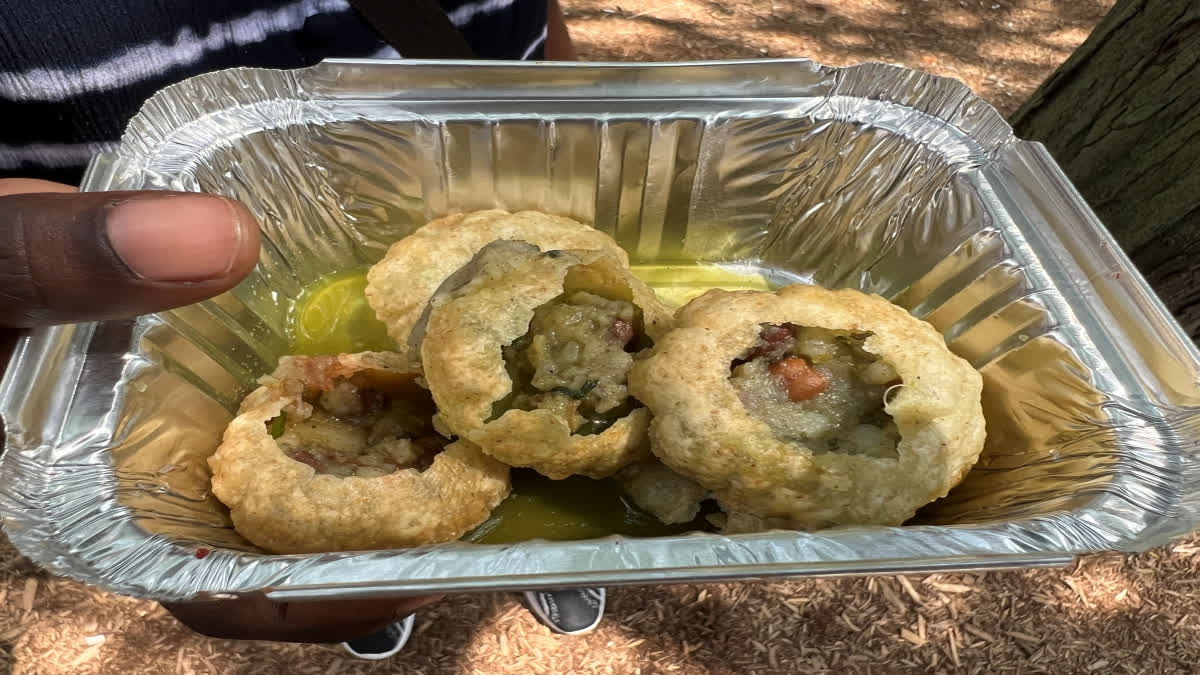New Delhi: The Food Safety and Standard Authority of India (FSSAI) has asked all food safety authorities across India to conduct surprise checks on panipuri vendors following complaints that ingredients unhealthy and risky for human health are mixed into Panipuri.
“Yes, we have received complaints from several states stating that people face health issues after consuming panipuri. Clear instructions have been issued to our branches to conduct surprise checks on both licensed and unlicensed pani puri vendors," a senior official from the FSSAI told ETV Bharat.
Excessive consumption of panipuri may lead to health issues including stomach aches, heart disease, and autoimmune disorders among others.
Recently FSSAI conducted an inspection in Karnataka which revealed that nearly 22 per cent of panipuri samples collected from across the state have failed the safety standards.
"We carried out the inspection in Karnataka, after receiving several complaints regarding the quality of panipuri being sold across the state," the official said. Of the 260 samples collected, 41 were found to contain artificial colouring and potentially cancer-causing chemicals in the sauce and chilli powder, which are unfit for consumption.
Additional 18 samples were found to be of poor quality, the official said. It is found that chemicals like brilliant blue, sunset yellow and tartrazine are used in the panipuri.
Brilliant Blue, or more commonly referred to as Blue 1 is a synthetic dye produced from petroleum. Consumption of large amounts of Brilliant Blue may cause allergic reactions, including skin rashes, hives, or nasal congestion in sensitive individuals.
Sunset Yellow is a synthetic azo dye used for colouring foods, including confectionery, desserts, soups, cheeses, savoury snacks, sauces, and preserved fruits. Its excess consumption may lead to nausea, rash, nasal congestion, rhinitis (runny nose), kidney swelling and chromosomal damage. Similarly, Tartrazine is a synthetic lemon yellow azo dye primarily used for food colouring. Its excess use may cause urticaria, angioedema etc.
When asked about the actions taken against such food vendors using chemicals, the officials said that if FSSAI testing detects such chemicals which are not good for health "their license may also be cancelled."
With its headquarters in New Delhi, FSSAI has four regional offices located in Delhi, Mumbai, Kolkata, and Chennai. There are 22 referral laboratories notified by FSSAI, 72 state and Union Territory laboratories located throughout India and 112 laboratories are NABL-accredited private laboratories notified by FSSAI.
Established by the Food Safety and Standards Act, 2006, FSSAI regulates the manufacture, storage, distribution, sale, and import of food articles, while also establishing standards to ensure food safety. The FSSAI is also facing another issue in the form of cheap quality imported and adulterated tea.
"The department has also decided to intensify testing of imported teas into India to check for compliance with Food Safety and Standards Authority of India (FSSAI) quality norms," the official added.
Another official from FSSAI's scientific community said that drinking fake tea leaves can affect the digestive ability of the stomach. “Drinking fake tea leaves for a long time may also cause adverse metabolism, diarrhoea, nausea," the official added. Surprise checks may also be conducted on tea stall vendors, the official added.
Although India is one of the major tea-producing countries, the country imports a good quantity of tea from abroad. As per data provided by the Indian Tea Association, during the period January-August 2023, tea imports stood at 14.75 million kilograms (mkg), with Nepal at 8.14 mkg, Kenya at 3.07 mkg, and Vietnam at 1.25 mkg. In January-August 2022, total imports into India were at 17.80 mkg.



